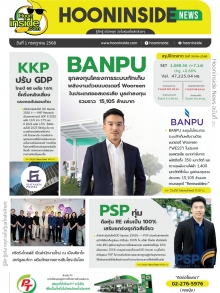สำนักข่าวหุ้นอินไซด์(9 พฤศจิกายน 2567)---------Fitch Ratings has affirmed Thailand's Long-Term Foreign-Currency Issuer Default Rating (IDR) at 'BBB+' with a Stable Outlook.
A full list of rating actions is at the end of this rating action commentary.
KEY RATING DRIVERS
Robust Externals, Structural Constraints: Thailand's ratings balance its sustained external finance strengths and sound macroeconomic policy framework against weaker structural features compared with that of 'BBB' category peers, such as lower per capita income and World Bank Governance Indicator scores.
Our baseline expects Thailand's government debt metrics will gradually stabilise at levels close to peer medians, following a period of relative deterioration in the past four years, assuming the government will follow through on its fiscal consolidation plans after this fiscal year ending September 2025 (FY25). A continuation of sizeable stimulus measures in the years ahead would pose risks to the medium-term fiscal outlook, especially since Thailand already faces demographic headwinds.
Growth Set to Strengthen: Fitch forecasts economic growth will accelerate to 3.1% in 2025, from an estimated 2.6% in 2024. Stronger growth prospects will be propelled by a continued tourism recovery, stepped-up government spending and improvements in private consumption. We expect tourism arrivals in 2025 will fully recover to pre-pandemic levels, driven by supportive policy initiatives. The upward revision of budget expenditure for FY25 and a normalisation of capital budget disbursement following significant delays in FY24 bode well for stronger domestic demand.
Uncertainties Remain: We expect the growth gains of the first government-funded THB145 billion (0.8% of GDP) cash handout to vulnerable groups to mitigate the damage of recent floods in northern Thailand. Stronger tourist visitation and private investment than our baseline assumption, potentially led by greater investor confidence and reduced political volatility, may boost growth. Downside risks include weaker global demand, such as a sharp growth slowdown among Thailand's major trading partners, heightened geopolitical tensions, and uncertainty over the US's post-election trade strategy.
Broad Policy Continuity: The swift parliamentary approval and royal endorsement of a new prime minister, with the Pheu Thai Party remaining the dominant party within the ruling coalition amid the recent political transition, should preserve broad policy continuity. We expect the government will prioritise stimulus measures to revive the economy and foster investment aimed at productivity gains. However, the leadership change underscores the potential for political volatility to affect the effectiveness of policymaking and confidence among foreign investors and local businesses.
Higher Fiscal Deficits: Fitch projects the general government deficit (Government Finance Statistics basis) will increase to 4.5% of GDP in FY25 (BBB median: 3.2%), from an estimated 3.8% in FY24. We assume the government will maximise the use of available resources within the existing fiscal framework to support the economy. Despite significant uncertainty around the execution of the remaining cash handouts of up to 1.6% of GDP, we believe the government will implement its fiscal stimulus under the approved FY25 budget one way or another to stimulate domestic demand.
Modest Fiscal Consolidation: We forecast gross general government debt (GGGD) will rise to 61.2% by FYE26 (BBB median: 59.1%) from an estimated 58.3% of GDP in FYE24. Our baseline projects the GGGD/GDP ratio will stabilise at around 61.5% by FYE28, which reflects our expectation of a slightly more measured pace of fiscal consolidation beyond FY25 than the government's deficit targets in the medium-term fiscal framework (MTFF).
The government is set to recalibrate the MTFF in late 2024. There could be political pressure for further spending measures beyond FY25, adding uncertainty to the trajectory of fiscal consolidation and government debt, in particular if increased spending provides only a short-lived economic boost rather than addressing structural growth impediments.
Public-Debt Risks Mitigated: We believe the risks from the higher public debt, which remains sensitive to growth assumptions, are mitigated by the government's access to deep domestic capital markets through the cycle and its solid fiscal financing capacity. This is evident from the lower financing costs than that of many 'BBB' category peers and our estimate of general government interest-to-revenue ratio of roughly 6% for FY24 (BBB median: 9%). A favourable government debt structure characterised by long average maturities and mostly in local currency supports medium-term fiscal sustainability.
Sustained External Strength: External finances have been robust despite Thailand's post-pandemic economic underperformance relative to regional peers. We forecast the current account surplus will widen to 2.9% of GDP in 2025 (2024: 2.1%) on continued service-balance recovery, and foreign-reserve buffers at roughly 7.4 months of current external payments (projected BBB median: 5.6 months). We forecast a large net external creditor position of 36.9% and 43.0% of GDP on a sovereign and economy-wide basis, respectively, at end-2025, above the projected median for 'BBB' and 'A' category peers.
Elevated Household Debt: Thailand's household debt-to-GDP ratio fell to below 90% by end-2Q24, the first time in four years, but the ratio remains above that of most regional peers. The elevated household debt burden will dampen policy effectiveness aimed at boosting consumer spending. Fitch has a neutral sector outlook on Thailand's banks. Downside risks to the banks' asset quality are highlighted by the indebtedness of low-income households and struggling SMEs. However, we believe the banks' solid core capital, robust loan-loss allowance coverage and stable liquidity profile should provide sound buffers.
ESG - Governance: Thailand has an ESG Relevance Score of '5' for Political Stability and Rights, and '5[+]' for the Rule of Law, Institutional and Regulatory Quality and Control of Corruption. These scores reflect the high weight that the World Bank Governance Indicators have in our proprietary Sovereign Rating Model. Thailand has a medium World Bank Governance Indicator ranking at the 47th percentile, reflecting sound institutional capacity and regulatory quality, and established rule of law, offset by persistent political volatility.
RATING SENSITIVITIES
Factors that Could, Individually or Collectively, Lead to Negative Rating Action/Downgrade
- Public Finances: Reduced confidence in the ability to narrow the fiscal deficit and stabilise the general government debt/GDP ratio over the medium term.
- Structural Features: Heightened political disruption on a scale sufficient to alter Thailand's economic policymaking effectiveness and growth prospects, or affect its tourism recovery.
Factors that Could, Individually or Collectively, Lead to Positive Rating Action/Upgrade
- Macroeconomic: An improvement in medium-term growth prospects without a significant rise in non-financial private-sector debt.
- Public Finances: A material decline in the general government debt/GDP ratio, for example, due to smaller fiscal deficits and/or improving medium-term growth potential.
SOVEREIGN RATING MODEL (SRM) AND QUALITATIVE OVERLAY (QO)
Fitch's proprietary SRM assigns Thailand a score equivalent to a rating of 'BBB' on the Long-Term Foreign-Currency (LT FC) IDR scale.
Fitch's sovereign rating committee adjusted the output from the SRM to arrive at the final LT FC IDR by applying its QO, relative to SRM data and output, as follows:
- Structural: We have removed the +1 notch introduced in November 2023, as the World Bank Governance Indicators have improved, even though we expect further improvements.
- External Finances: We have introduced a new positive notch to reflect Thailand's external finance strengths not captured in the SRM, including its large net external creditor position.
Fitch's SRM is the agency's proprietary multiple regression rating model that employs 18 variables based on three-year centred averages, including one year of forecasts, to produce a score equivalent to a LT FC IDR. Fitch's QO is a forward-looking qualitative framework designed to allow for adjustment to the SRM output to assign the final rating, reflecting factors within our criteria that are not fully quantifiable and/or not fully reflected in the SRM.
COUNTRY CEILING
The Country Ceiling for Thailand is 'A-', one notch above the LT FC IDR. This reflects moderate constraints and incentives, relative to the IDR, against capital or exchange controls being imposed that would prevent or significantly impede the private sector from converting local currency into foreign currency and transferring the proceeds to non-resident creditors to service debt payments.
Fitch's Country Ceiling Model produced a starting point uplift of one notch above the IDR. Fitch's rating committee did not apply a qualitative adjustment to the model result.
REFERENCES FOR SUBSTANTIALLY MATERIAL SOURCE CITED AS KEY DRIVER OF RATING
The principal sources of information used in the analysis are described in the Applicable Criteria.
ESG CONSIDERATIONS
Thailand has an ESG Relevance Score of '5' for Political Stability and Rights as World Bank Governance Indicators have the highest weight in Fitch's SRM and are therefore highly relevant to the rating and a key rating driver with a high weight. As Thailand has a percentile rank below 50 for the respective Governance Indicator, this has a negative impact on the credit profile.
Thailand has an ESG Relevance Score of '5[+]' for Rule of Law, Institutional & Regulatory Quality and Control of Corruption as World Bank Governance Indicators have the highest weight in Fitch's SRM and are therefore highly relevant to the rating and are a key rating driver with a high weight. As Thailand has a percentile rank above 50 for the respective Governance Indicators, this has a positive impact on the credit profile.
Thailand has an ESG Relevance Score of '4' for Human Rights and Political Freedoms as the Voice and Accountability pillar of the World Bank Governance Indicators is relevant to the rating and a rating driver. As Thailand has a percentile rank below 50 for the respective Governance Indicator, this has a negative impact on the credit profile.
Thailand has an ESG Relevance Score of '4[+]' for Creditor Rights as willingness to service and repay debt is relevant to the rating and is a rating driver for Thailand, as for all sovereigns. As Thailand has a track record of 20+ years without a restructuring of public debt and captured in our SRM variable, this has a positive impact on the credit profile.
The highest level of ESG credit relevance is a score of '3', unless otherwise disclosed in this section. A score of '3' means ESG issues are credit-neutral or have only a minimal credit impact on the entity, either due to their nature or the way in which they are being managed by the entity. Fitch's ESG Relevance Scores are not inputs in the rating process; they are an observation on the relevance and materiality of ESG factors in the rating decision. For more information on Fitch's ESG Relevance Scores, visit www.fitchratings.com/topics/esg/products#esg-relevance-scores.

















